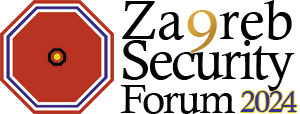
Confirmed speakers and panelists for the 4
th Zagreb Security Forum, scheduled on March 15-16
th, 2019.
At the 4th Zagreb Security Forum you will be able to listen, see and meet following experts that will offer their knowledge from the domains of various critical infrastructure protections (energy, water, and cyber).
Dr. Gordan Akrap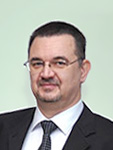 , Hybrid Warfare Research Institute, Croatia, born 1966, graduated at Zagreb Faculty of electronics and computing in 1994. In 2011 he received a PhD at the University of Zagreb, in the field of Information and Communication sciences. The title of his PhD was “Informational strategies and operations in public knowledge shaping”. He had an active role in Homeland war. During his career in diplomatic and security structures of Croatia he completed a number of professional courses, including Diplomatic Academy. He is active in research of national and regional security, intelligence and history of Homeland War. He published a number of books, and papers in journals and proceedings.
, Hybrid Warfare Research Institute, Croatia, born 1966, graduated at Zagreb Faculty of electronics and computing in 1994. In 2011 he received a PhD at the University of Zagreb, in the field of Information and Communication sciences. The title of his PhD was “Informational strategies and operations in public knowledge shaping”. He had an active role in Homeland war. During his career in diplomatic and security structures of Croatia he completed a number of professional courses, including Diplomatic Academy. He is active in research of national and regional security, intelligence and history of Homeland War. He published a number of books, and papers in journals and proceedings.
Sebastian Bay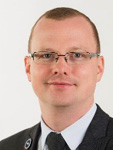 is a Senior Expert at the Technical and Scientific Development Branch of the NATO Strategic Communications Centre of Excellence in Riga, Latvia. Sebastian has a background at the Counter Influence Unit of the Swedish Civil Contingency Agency where he was the project manager for the preparations undertaken to protect the Swedish general elections in 2018. Sebastian is currently the project manager of a NATO StratCom COE project on countering the malicious use of social media.
is a Senior Expert at the Technical and Scientific Development Branch of the NATO Strategic Communications Centre of Excellence in Riga, Latvia. Sebastian has a background at the Counter Influence Unit of the Swedish Civil Contingency Agency where he was the project manager for the preparations undertaken to protect the Swedish general elections in 2018. Sebastian is currently the project manager of a NATO StratCom COE project on countering the malicious use of social media.
Dr. Goran Belamarić , Assistant Professor(1956), (Faculty of Maritime Studies/PFST, University of Split), holds a PhD in the Scientific field, Technical Sciences, field,"Transport Technology". Served 30 years at sea, with 20 years sea service experience as ship’s Captain/Master of the vessels on top world marine containers companies. In possession of Unlimited Master License for ship 3000 GT & Over with all other relevant certificates according STCW95/2010. On 2005 quit from sea, 2008 joined PFST. “Lecturer at the Faculty of Maritime Studies Split and University of Zadar – Marine Department on courses/subjects for students in the fields of Cargo handling and ship stability, Safety management and maritime risk, Ship control and inspection, Cargo and ship knowledge, Ship Maneuvering and Handling, Seamanship skills. Working on scientific research project on international, EU and domestic projects and studies.
, Assistant Professor(1956), (Faculty of Maritime Studies/PFST, University of Split), holds a PhD in the Scientific field, Technical Sciences, field,"Transport Technology". Served 30 years at sea, with 20 years sea service experience as ship’s Captain/Master of the vessels on top world marine containers companies. In possession of Unlimited Master License for ship 3000 GT & Over with all other relevant certificates according STCW95/2010. On 2005 quit from sea, 2008 joined PFST. “Lecturer at the Faculty of Maritime Studies Split and University of Zadar – Marine Department on courses/subjects for students in the fields of Cargo handling and ship stability, Safety management and maritime risk, Ship control and inspection, Cargo and ship knowledge, Ship Maneuvering and Handling, Seamanship skills. Working on scientific research project on international, EU and domestic projects and studies.
Prof. Dr. Marc Cools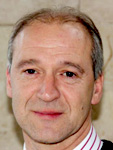 , University of Gent, (b. 1962) holds a PhD in Criminology (Free University of Brussels) and certificates in Business Economics (IPO Management School- Antwerp University) and International Management in the Telecommunications Industry (London Business School). He had different higher-management and board positions in the private security services industry: Bell Telephone ITT nv, Alcatel Bell nv, Shield nv and Faceo Security & Prevention nv. Currently, he is a member of the board at Securitas Training nv and member of the Mont Pèlerin Society.
, University of Gent, (b. 1962) holds a PhD in Criminology (Free University of Brussels) and certificates in Business Economics (IPO Management School- Antwerp University) and International Management in the Telecommunications Industry (London Business School). He had different higher-management and board positions in the private security services industry: Bell Telephone ITT nv, Alcatel Bell nv, Shield nv and Faceo Security & Prevention nv. Currently, he is a member of the board at Securitas Training nv and member of the Mont Pèlerin Society.
He lectured at the Antwerp Police Academy and at the School for Criminology of the Justice Department. He was advisor for the former Belgian Justice Minister, Mr. Marc Verwilghen. Today he is Professor of Criminology at the Free University of Brussels and at Ghent University, he is also Visiting Professor at the Nyenrode University and Paris X University. He also lectures at Antwerp Management School and at the Intelligence & Security School of the Ministry of Defence.
Prof.Dr. Zoran Dragišić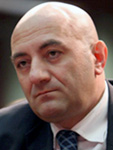 is full professor and vice dean for development on Faculty of Security Studies – University of Belgrade. He has served in the National Assembly of Serbia since 2016 as part of the parliamentary grouping of the Serbian Progressive Party (Srpska napredna stranka; SNS). He was previously a candidate for president of Serbia in the 2012 presidential election. He graduated from the University of Belgrade Faculty of Security Studies in 1991 as valedictorian and subsequently earned a master's degree (1999) and Ph.D. (2004) from the university's law faculty. Dragišić was a founding member of Vuk Obradović's Social Democracy (Socijaldemokratija; SD) party. This party eventually became divided and factionalized, and in January 2008 Dragišić established a breakaway group called the Independent Social Democrats (Nezavisni Socijaldemokrata, NSD). In August 2009, Dragišić merged the NSD into the newly formed Social Democratic Party of Serbia (Socijaldemokratska partija Srbije; SDPS) led by Rasim Ljajić. In October 2011 he was chosen as leader of a new group called the Movement of Workers and Peasants of Serbia (Pokret radnika i seljaka; PRS). He is currently a member of the parliamentary defence and internal affairs committee; a deputy member of three other committees; a deputy member of Serbia's delegation to the NATO Parliamentary Assembly; the head of the parliamentary friendship group with Turkey; and a member of the parliamentary friendship groups with China, Israel, Syria, the United Kingdom, and the United States of America.
is full professor and vice dean for development on Faculty of Security Studies – University of Belgrade. He has served in the National Assembly of Serbia since 2016 as part of the parliamentary grouping of the Serbian Progressive Party (Srpska napredna stranka; SNS). He was previously a candidate for president of Serbia in the 2012 presidential election. He graduated from the University of Belgrade Faculty of Security Studies in 1991 as valedictorian and subsequently earned a master's degree (1999) and Ph.D. (2004) from the university's law faculty. Dragišić was a founding member of Vuk Obradović's Social Democracy (Socijaldemokratija; SD) party. This party eventually became divided and factionalized, and in January 2008 Dragišić established a breakaway group called the Independent Social Democrats (Nezavisni Socijaldemokrata, NSD). In August 2009, Dragišić merged the NSD into the newly formed Social Democratic Party of Serbia (Socijaldemokratska partija Srbije; SDPS) led by Rasim Ljajić. In October 2011 he was chosen as leader of a new group called the Movement of Workers and Peasants of Serbia (Pokret radnika i seljaka; PRS). He is currently a member of the parliamentary defence and internal affairs committee; a deputy member of three other committees; a deputy member of Serbia's delegation to the NATO Parliamentary Assembly; the head of the parliamentary friendship group with Turkey; and a member of the parliamentary friendship groups with China, Israel, Syria, the United Kingdom, and the United States of America.
Dr. Laris Gaiser , ITSTIME. Graduated in Law at the University of Verona in 2002 with a final dissertation on “The consequences of the devolution of power in United Kingdom and the new role of the State in public economy”, earned his Master’s degree in International Affairs and Diplomacy from the Institute for International Political Studies (ISPI) of Milano and, after a specialization in crisis management and humanitarian action at UN Staff College, obtained a Ph.D. in Geopolitical Economy at University Guglielmo Marconi of Rome.From 2012 to 2014 he was Vice President, acting President, of Euro Mediterranean University – EMUNI and member Slovenian Minister of Foreign Affairs’ Strategic Council. Laris Gaiser is president of Slovenian Paneuropean Movement and Presidency member of International Paneuropean Union (Strasbourg). Involved in strategic consultancy, he also served as general manager in several international companies. As a member of ITSTIME – Italian Team for Security, Terroristic Issues and Managing Emergencies - at Catholic University of Milan (Italy), Senior Scholar at Center for the Study of Global Issues at University of Georgia (USA) and Visiting Lecturer at Diplomatic Academy of Vienna, he regularly teaches geopolicy, geoeconomy and intelligence issues
, ITSTIME. Graduated in Law at the University of Verona in 2002 with a final dissertation on “The consequences of the devolution of power in United Kingdom and the new role of the State in public economy”, earned his Master’s degree in International Affairs and Diplomacy from the Institute for International Political Studies (ISPI) of Milano and, after a specialization in crisis management and humanitarian action at UN Staff College, obtained a Ph.D. in Geopolitical Economy at University Guglielmo Marconi of Rome.From 2012 to 2014 he was Vice President, acting President, of Euro Mediterranean University – EMUNI and member Slovenian Minister of Foreign Affairs’ Strategic Council. Laris Gaiser is president of Slovenian Paneuropean Movement and Presidency member of International Paneuropean Union (Strasbourg). Involved in strategic consultancy, he also served as general manager in several international companies. As a member of ITSTIME – Italian Team for Security, Terroristic Issues and Managing Emergencies - at Catholic University of Milan (Italy), Senior Scholar at Center for the Study of Global Issues at University of Georgia (USA) and Visiting Lecturer at Diplomatic Academy of Vienna, he regularly teaches geopolicy, geoeconomy and intelligence issues
Benjamin Heap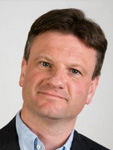 has over 23 years’ experience working in communications, first as a creative in the UK television industry and then as a Strategic Communications practitioner in international security and defence. He spent nearly five years in Afghanistan working in influence and outreach, both with the British Army and as a NATO civilian, before joining the NATO Strategic Communications Centre of Excellence, Riga, in 2016. Here he has been involved in several projects, including the use of social media in counter-terrorism operations, working with the private sector to develop best practice and understanding Russia’s influence in the Nordic-Baltic region.
has over 23 years’ experience working in communications, first as a creative in the UK television industry and then as a Strategic Communications practitioner in international security and defence. He spent nearly five years in Afghanistan working in influence and outreach, both with the British Army and as a NATO civilian, before joining the NATO Strategic Communications Centre of Excellence, Riga, in 2016. Here he has been involved in several projects, including the use of social media in counter-terrorism operations, working with the private sector to develop best practice and understanding Russia’s influence in the Nordic-Baltic region.
He has just completed a long-term project that develops our understanding of hybrid threats and provides guidance to NATO on how Strategic Communications can counter such threats.
Brigadier General (Res.) Dr. Ephraim Lapid , Bar Ilan University, Israel. Extensive and diverse experience in the military and public affairs arenas. He holds a BA in Middle East Studies and Arabic from the Hebrew University in Jerusalem, a teacher's degree, an M.A. and a Ph.D. in political science. His research examines the development of the Israeli intelligence community during the years 1964 to 1979.
, Bar Ilan University, Israel. Extensive and diverse experience in the military and public affairs arenas. He holds a BA in Middle East Studies and Arabic from the Hebrew University in Jerusalem, a teacher's degree, an M.A. and a Ph.D. in political science. His research examines the development of the Israeli intelligence community during the years 1964 to 1979.
During his long military career, Lapid was a senior officer in the Israel Defense Forces (IDF) Intelligence Corps, served as an IDF Spokesperson, and was a senior instructor at the National Defense College. He was also the head of Israel Army Radio, Galei Zahal. Following his retirement from the army, Lapid has served in both the public and private sectors. A prolific author, Lapid has written numerous articles on Israeli intelligence, media and security. He edited a book in English on Israeli intelligence (Israel's Silent Defender). Active in public life, Lapid serves on the board of several public education and non-profit organizations.
Marius Laurinavicius has a masters in International relations Institte for International relations and Political Science in Vilnius, Lithuania, and in Journalism Institute of Jorunalism from Vilnius university. He is a Senior expert Vilnius Institute for Policy Analysis, Vilnius (Lithuania) where he works on Research on Russia and European security issues. He was fellow of Hudson institute, Washintgton DC (USA) and adjucent lecturer of Foreign Service Institue at Arlington, Virginia (USA) about Russian disinformation activities.
has a masters in International relations Institte for International relations and Political Science in Vilnius, Lithuania, and in Journalism Institute of Jorunalism from Vilnius university. He is a Senior expert Vilnius Institute for Policy Analysis, Vilnius (Lithuania) where he works on Research on Russia and European security issues. He was fellow of Hudson institute, Washintgton DC (USA) and adjucent lecturer of Foreign Service Institue at Arlington, Virginia (USA) about Russian disinformation activities.
Ir. Yvan De Mesmaeker Secretary general of the European Corporate Security Association – ECSA, Yvan De Mesmaeker is a Civil Engineer with over 25 years of professional experience in Corporate Security and Resilience. The European Corporate Security Association - ECSA, a non for profit Professional Association of Managers and Officials in charge of the Security & Resilience of Corporations and International Institutions.
Secretary general of the European Corporate Security Association – ECSA, Yvan De Mesmaeker is a Civil Engineer with over 25 years of professional experience in Corporate Security and Resilience. The European Corporate Security Association - ECSA, a non for profit Professional Association of Managers and Officials in charge of the Security & Resilience of Corporations and International Institutions.
Assistant Professor Robert Mikac , PhD, a versatile person with very rich practical and theoretical experience from various structures of the security sector of the Republic of Croatia. During his career he worked on various duties in Croatia and abroad from operative, over tactical to strategic level. He is an internationally recognized expert for various security areas. For merit in Afghanistan he was awarded with the NATO Medal and the Order of Merit of the Italian Republic.
, PhD, a versatile person with very rich practical and theoretical experience from various structures of the security sector of the Republic of Croatia. During his career he worked on various duties in Croatia and abroad from operative, over tactical to strategic level. He is an internationally recognized expert for various security areas. For merit in Afghanistan he was awarded with the NATO Medal and the Order of Merit of the Italian Republic.
Additionally, he is a member of the Homeland Security Council of the President of the Republic of Croatia, author of three books and more than thirty scientific articles.
.
Prof. Dr. John M. Nomikos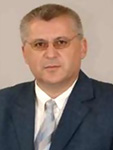 , RIEAS, Greece, Director at the Research Institute for European and American Studies, Chairman of the Mediterranean Council for Intelligence Studies (MCIS), Chairman of the Greek Intelligence Studies Association (GISA), Chairman of the European Intelligence Academy (EIA) and Founding Editor, Journal of Mediterranean and Balkan Intelligence (JMBI). He is Assistant Professor in the Webster University (Athens Campus) and Head, Department of International Relations, History and Politics. He is also Visiting Professor at the Peace Keeping Security Studies (postgraduate program) in the University of Rome (Tre) in Italy. He was Adjunct Professor (2005-2007) at the Department of International Relations in the University of Indianapolis (Athens Camus). He earned his Bachelor Degree in Sociology at the Northeast Louisiana University in 1987, his Masters Degree in European Integration and Cooperation at the University of Hull, 1991, and his Doctorate Diploma in International Relations and Diplomacy at the Washington International University in 2001. He specializes on transatlantic intelligence studies, intelligence reform, and national security architecture. He has done research and studied in various research institutions in USA, UK, Norway, Finland, Germany and Israel.
, RIEAS, Greece, Director at the Research Institute for European and American Studies, Chairman of the Mediterranean Council for Intelligence Studies (MCIS), Chairman of the Greek Intelligence Studies Association (GISA), Chairman of the European Intelligence Academy (EIA) and Founding Editor, Journal of Mediterranean and Balkan Intelligence (JMBI). He is Assistant Professor in the Webster University (Athens Campus) and Head, Department of International Relations, History and Politics. He is also Visiting Professor at the Peace Keeping Security Studies (postgraduate program) in the University of Rome (Tre) in Italy. He was Adjunct Professor (2005-2007) at the Department of International Relations in the University of Indianapolis (Athens Camus). He earned his Bachelor Degree in Sociology at the Northeast Louisiana University in 1987, his Masters Degree in European Integration and Cooperation at the University of Hull, 1991, and his Doctorate Diploma in International Relations and Diplomacy at the Washington International University in 2001. He specializes on transatlantic intelligence studies, intelligence reform, and national security architecture. He has done research and studied in various research institutions in USA, UK, Norway, Finland, Germany and Israel.
Velimir Ostoić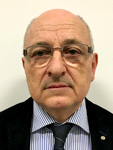 , Adriatic Security Solutions d.o.o., Croatia, CEO of Adriatic Security Solutions d.o.o., born 1950. in Varaždin, Croatia, graduated from the University of Zagreb, Faculty of Traffic and Transportation Sciences. He is an entrepreneur mainly involved in project management, consulting, development of threat assessments and risk analysis, security systems design, project revision and facility security plan development. Involved in the area of intelligent transportation systems applications in which he published several papers.
, Adriatic Security Solutions d.o.o., Croatia, CEO of Adriatic Security Solutions d.o.o., born 1950. in Varaždin, Croatia, graduated from the University of Zagreb, Faculty of Traffic and Transportation Sciences. He is an entrepreneur mainly involved in project management, consulting, development of threat assessments and risk analysis, security systems design, project revision and facility security plan development. Involved in the area of intelligent transportation systems applications in which he published several papers.
Prof.Dr. Iztok Podbregar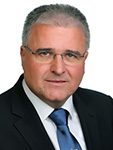 is a Full Professor at the Faculty of Organizational Sciences, University of Maribor and Dean. His major interests concern crisis management, critical infrastructure and human resource management. He teaches at undergraduate, master and doctoral level. He is author of several monographs, books, scientific articles published in Slovenia and abroad.
is a Full Professor at the Faculty of Organizational Sciences, University of Maribor and Dean. His major interests concern crisis management, critical infrastructure and human resource management. He teaches at undergraduate, master and doctoral level. He is author of several monographs, books, scientific articles published in Slovenia and abroad.
Dr. Tonći Prodan , Portus et Navem Ltd., Croatia, (born 1965), graduated from the Split Faculty of Maritime Studies. He worked for a number of years in the field of maritime affairs, first as a merchant naval officer in international traffic, then as crew member on oil platforms, and later as employee and manager in the area of maritime economy. He resumed his studies by enrolling at the Faculty of Criminology from which he graduated and earning a bachelor’s degree in criminology. Furthermore, he obtained a master’s degree at the Faculty of Political Science with thesis titled Common Foreign and Security Policy of the European Union and Combat against Terrorism and later received PhD in Comparative Politics with a doctoral thesis titled The USA and the EU in the Combat against Terrorism – Strategies, Models and Results.
, Portus et Navem Ltd., Croatia, (born 1965), graduated from the Split Faculty of Maritime Studies. He worked for a number of years in the field of maritime affairs, first as a merchant naval officer in international traffic, then as crew member on oil platforms, and later as employee and manager in the area of maritime economy. He resumed his studies by enrolling at the Faculty of Criminology from which he graduated and earning a bachelor’s degree in criminology. Furthermore, he obtained a master’s degree at the Faculty of Political Science with thesis titled Common Foreign and Security Policy of the European Union and Combat against Terrorism and later received PhD in Comparative Politics with a doctoral thesis titled The USA and the EU in the Combat against Terrorism – Strategies, Models and Results.
After his maritime service, he had been professionally involved in issues related to national and international security for a number of years as member of the Croatian security system. He published a several scientific articles in the fields of terrorism and counterterrorism in journals and proceedings.
Prof. Dr. Shlomo Shpiro , president of International Intelligence History association, Israel, Head of the Europa Institute at bar Ilan University and Senior Research Fellow at the BESA Center for Strategic Studies. Since 2008 he is also Chairman of the International Intelligence History Association (IIHA).
, president of International Intelligence History association, Israel, Head of the Europa Institute at bar Ilan University and Senior Research Fellow at the BESA Center for Strategic Studies. Since 2008 he is also Chairman of the International Intelligence History Association (IIHA).
He specializes in intelligence, terrorism and security studies. His research activities concentrate on the role of intelligence services as political mediators in the international arena, the intelligence activities of terror organisations, intelligence ethics and political influence, and on security crisis management and crisis communication.
Rear admiral (lower half - ret). Marin Stošić is a retired from Croatian Navy. He completed all levels of naval education, including the "Ban Josip Jelačić" War School in Zagreb in 2003. He has been managing many operations and joint sea exercises in the national and international (NATO) environment.He has spent majority of his career on high command duties related to the protection of national interests at sea. In the period from 2011. to the end of 2014.,he served as the Commander of the Coast Guard of the Republic of Croatia. At the same time he participated in domestic and international conferences (round tables) in the field of international and national maritime security.He published several scientific works referring to general maritime security.
is a retired from Croatian Navy. He completed all levels of naval education, including the "Ban Josip Jelačić" War School in Zagreb in 2003. He has been managing many operations and joint sea exercises in the national and international (NATO) environment.He has spent majority of his career on high command duties related to the protection of national interests at sea. In the period from 2011. to the end of 2014.,he served as the Commander of the Coast Guard of the Republic of Croatia. At the same time he participated in domestic and international conferences (round tables) in the field of international and national maritime security.He published several scientific works referring to general maritime security.
Polona Šprajc (Ph.D.) is an Assistant Professor at the Faculty of Organizational Sciences, University of Maribor in the Department of Personnel and Vice dean for educational activity. Her major research interests concern human resource management, marketing and business ethics. She teaches on undergraduate and masterlevel.
is an Assistant Professor at the Faculty of Organizational Sciences, University of Maribor in the Department of Personnel and Vice dean for educational activity. Her major research interests concern human resource management, marketing and business ethics. She teaches on undergraduate and masterlevel.
She is author of chapters in books and articles in scientific and professional journals, published in Slovenia and abroad.
Dr. Darko Trifunović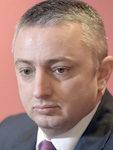 , Director of the Institute for National and International Security, professor at Faculty of Law, Administration and Security, Megatrend University, Belgrade. Dr Trifunovic was elected as guest professor at FUDAN University – Center of American Studies, Shanghai, China. Senior Research Fellow and lecturer at Faculty of Security Studies-University of Belgrade. He is Senior Adviser at the Research Institute for European and American Studies, Greece, Athens. He is a specialist in Security studies, Intelligence & Counter Intelligence studies as well as Counter-Terrorism, National and International Security studies. He is a former diplomat (First Secretary of the Foreign Service of Bosnia and Herzegovina at the United Nations). Dr. Trifunovic is the representative for Serbia and Montenegro of International Strategic Studies Association (ISSA); Defense & Foreign Affairs publications; and the Global Information System and he is member of the Advisory Board of the Institute of Transnational Studies, Munich, Germany. The Shanghai Center for International Studies appointed him as the first foreign expert for the Olympic Games (2008) security preparation in China. In 2010, he is engaged in World Expo Security preparation and is a Member. Dr Trifunovic is regular speaker at International Counter Terrorism Institute, Tel Aviv, Israel, and prof.dr Darko Trifunovic is one of the founding Members of the International Counter Terrorism Academic Community (ICTAC). He has published numbers of academic books papers and articles.
, Director of the Institute for National and International Security, professor at Faculty of Law, Administration and Security, Megatrend University, Belgrade. Dr Trifunovic was elected as guest professor at FUDAN University – Center of American Studies, Shanghai, China. Senior Research Fellow and lecturer at Faculty of Security Studies-University of Belgrade. He is Senior Adviser at the Research Institute for European and American Studies, Greece, Athens. He is a specialist in Security studies, Intelligence & Counter Intelligence studies as well as Counter-Terrorism, National and International Security studies. He is a former diplomat (First Secretary of the Foreign Service of Bosnia and Herzegovina at the United Nations). Dr. Trifunovic is the representative for Serbia and Montenegro of International Strategic Studies Association (ISSA); Defense & Foreign Affairs publications; and the Global Information System and he is member of the Advisory Board of the Institute of Transnational Studies, Munich, Germany. The Shanghai Center for International Studies appointed him as the first foreign expert for the Olympic Games (2008) security preparation in China. In 2010, he is engaged in World Expo Security preparation and is a Member. Dr Trifunovic is regular speaker at International Counter Terrorism Institute, Tel Aviv, Israel, and prof.dr Darko Trifunovic is one of the founding Members of the International Counter Terrorism Academic Community (ICTAC). He has published numbers of academic books papers and articles.
Prof. Dr. Miroslav Tuđman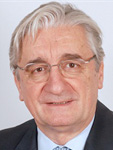 , St. George Association, Croatia, (b. 1946, Belgrade) Professor of information theory at the Philosophical Faculty of the University of Zagreb. Deputy Director of the Office for National Security (UNS) and the Director of the Croatian Intelligence Service (HIS) from 1993 to 1998, and from 1999 to 2000.
, St. George Association, Croatia, (b. 1946, Belgrade) Professor of information theory at the Philosophical Faculty of the University of Zagreb. Deputy Director of the Office for National Security (UNS) and the Director of the Croatian Intelligence Service (HIS) from 1993 to 1998, and from 1999 to 2000.
Contributed to various scientific projects, published four books and over a hundred articles in scientific journals; editor of a dozen miscellaneous works. Active in research, both in the field of information theory and national security and intelligence.
Dr. Giliam de Valk initiated, coordinated, and lectured at different academies a minor intelligence studies. Dr. G.G. (Giliam) de Valk (1961) studied at the Law Faculty of Leiden University. He wrote his dissertation (2005) at the Law Faculty of University of Groningen on the quality of intelligence analyses: Valk, Giliam de, Dutch Intelligence: Towards a Qualitative Framework for Analysis. Den Haag: Boom juridisch, 2005. Since 2016 he is assistant professor at the Institute of Security and Global Affairs (ISGA) of the Leiden University. He lectures and researches on intelligence, analysis and methodology. After his dissertation he started to work as a lecturer at the Department for Political Science (2006-2008) and at the Institute for Interdisciplinary Studies (2007- 2016) of the University of Amsterdam. At this Institute, he was the initiator and coordinator of the Minor Intelligence Studies (2007-2016). In 2012, he transformed this Bachelor Minor Intelligence Studies into a center: the Ad de Jonge Center for Intelligence and Security Studies. In 2016, he and his team transferred to the ISGA (see above).From 2006-2011, he was a lecturer for the History of International Relations Section at the University of Utrecht. He taught on issues as intelligence studies, strategy (Von Clausewitz), humanitarian intervention, counterinsurgency, terrorism and counter-terrorism.
initiated, coordinated, and lectured at different academies a minor intelligence studies. Dr. G.G. (Giliam) de Valk (1961) studied at the Law Faculty of Leiden University. He wrote his dissertation (2005) at the Law Faculty of University of Groningen on the quality of intelligence analyses: Valk, Giliam de, Dutch Intelligence: Towards a Qualitative Framework for Analysis. Den Haag: Boom juridisch, 2005. Since 2016 he is assistant professor at the Institute of Security and Global Affairs (ISGA) of the Leiden University. He lectures and researches on intelligence, analysis and methodology. After his dissertation he started to work as a lecturer at the Department for Political Science (2006-2008) and at the Institute for Interdisciplinary Studies (2007- 2016) of the University of Amsterdam. At this Institute, he was the initiator and coordinator of the Minor Intelligence Studies (2007-2016). In 2012, he transformed this Bachelor Minor Intelligence Studies into a center: the Ad de Jonge Center for Intelligence and Security Studies. In 2016, he and his team transferred to the ISGA (see above).From 2006-2011, he was a lecturer for the History of International Relations Section at the University of Utrecht. He taught on issues as intelligence studies, strategy (Von Clausewitz), humanitarian intervention, counterinsurgency, terrorism and counter-terrorism.
- 2006 onwards, he participates as a guest lecturer in the analyst education of the Defense Intelligence and Security Institute (DISI).
- 2010-2012, he was employed at the Netherlands Defense Academy in Breda, at Faculty of Military Sciences, where he had put up and coordinated a Bachelor Minor Intelligence Studies.
- 2004-2012, he was the secretary of the Netherlands Intelligence Security Association, of which he is still a board member.
- 2006-2012, he was a member of the Archive Committee of Ministry of Foreign Affairs.
- Since 2009, he participates in the Dutch Counterinsurgency Network.
- Since 2012, he is a member of the Dutch Think Tank Integral Security.
- De Valk participates for many years in Red Team exercises concerning vital infrastructure and corporate business.
Prof.Dr. Mladen Vedriš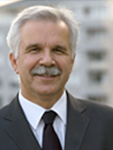 , University of Zagreb, Faculty of Law – Head of Department of Economic Sciences. Prof.dr. Mladen Vedriš was born on 29 December 1950 in Zagreb. His scientific research career began at the Center for the Research of Migration of the University of Zagreb. In 1990, he became president of the executive council of the city of Zagreb (the equivalent today is the position of mayor). In 1992, he became a member of the national government, eventually serving as the deputy prime minister for economics. From 1993 to 1995 he was president of the Croatian Chamber of Commerce. In 1996, he founded the strategic consulting company Sonder d.o.o. Since 2005, he has been a professor at the Faculty of Law in Zagreb and the head of the Department of Economic Sciences.
, University of Zagreb, Faculty of Law – Head of Department of Economic Sciences. Prof.dr. Mladen Vedriš was born on 29 December 1950 in Zagreb. His scientific research career began at the Center for the Research of Migration of the University of Zagreb. In 1990, he became president of the executive council of the city of Zagreb (the equivalent today is the position of mayor). In 1992, he became a member of the national government, eventually serving as the deputy prime minister for economics. From 1993 to 1995 he was president of the Croatian Chamber of Commerce. In 1996, he founded the strategic consulting company Sonder d.o.o. Since 2005, he has been a professor at the Faculty of Law in Zagreb and the head of the Department of Economic Sciences.
He has been a member of the council of the Croatian National Bank, the president of the Advisory Council for the Agency for Promoting Exports and Investment, a member of the Economic Council of the Prime Minister of Croatia, and since 2011, president of the Partnership Council of Zagreb. He is an expert in the area of macroeconomic analysis, regional development, industrial policy, and competitiveness. He has published several scientific and professional works and has participated in several foreign and domestic scientific research projects.
Prof. Dr. Slavko Vidović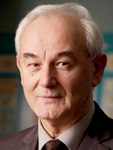 , Infodom d.o.o. Croatia. Throughout his career he has been active in leading large-scale projects in the area of state authority, public companies and organisations. In addition to that, through his scientific-educational efforts he has contributed to a number of scientific and research projects, such as artificial intelligence-specific area, supporting systems in decision-making and application development.
, Infodom d.o.o. Croatia. Throughout his career he has been active in leading large-scale projects in the area of state authority, public companies and organisations. In addition to that, through his scientific-educational efforts he has contributed to a number of scientific and research projects, such as artificial intelligence-specific area, supporting systems in decision-making and application development.
He lectures at the Faculty of Organisation and Informatics of the University in Zagreb and holds membership at the National Competitiveness Council, PMI and Tele Management Forum.
Aleksandra Gasztold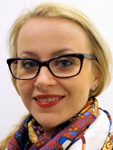 , Ph.D, Habil. political scientist, associate professor at the Faculty of Political Sciences and International Studies, University of Warsaw (Poland). She conducts research on contemporary terrorism and counterterrorism. A scholarship holder of the University of Indiana in Bloomington, the University of Konstanz, the Vienna University and Johannes Gutenberg University Mainz. Thematic editor (security studies) of the Scientific Quarterly "e-Politikon" of the Political Analyses Center of the University of Warsaw (OAP UW) Expert of the Government Centre for Security (RCB). Member of Steering Committee Women in International Security (WISS Poland). Author of various works on counterterrorism and feminist perspective in studies on terrorism, including: ‘A Feminist Approach to Security Studies’, Przegląd Politologiczny 2017, No. 3 and ‘The Problem of Security Through the Gendered Lens’, Annals of the University of Craiova, Series: Philology - English 2016, Year XVII, No. 1.
, Ph.D, Habil. political scientist, associate professor at the Faculty of Political Sciences and International Studies, University of Warsaw (Poland). She conducts research on contemporary terrorism and counterterrorism. A scholarship holder of the University of Indiana in Bloomington, the University of Konstanz, the Vienna University and Johannes Gutenberg University Mainz. Thematic editor (security studies) of the Scientific Quarterly "e-Politikon" of the Political Analyses Center of the University of Warsaw (OAP UW) Expert of the Government Centre for Security (RCB). Member of Steering Committee Women in International Security (WISS Poland). Author of various works on counterterrorism and feminist perspective in studies on terrorism, including: ‘A Feminist Approach to Security Studies’, Przegląd Politologiczny 2017, No. 3 and ‘The Problem of Security Through the Gendered Lens’, Annals of the University of Craiova, Series: Philology - English 2016, Year XVII, No. 1.
Przemysław Gasztold , Ph. D. research fellow at the Historic Research Office of the Institute of National Remembrance in Warsaw and Assistant Professor at the War Studies University, Department of Terrorism Studies in Warsaw. He received his Ph.D. from the Warsaw University, Faculty of Journalism and Political Science in 2016. He is currently conducting research on Polish intelligence services, on relations between foreign policy and arms trade, on relations between Poland, the Middle East, African countries, on factions within the Polish United Workers’ Party, and the ties between the Soviet Bloc and international terrorism during the Cold War.
, Ph. D. research fellow at the Historic Research Office of the Institute of National Remembrance in Warsaw and Assistant Professor at the War Studies University, Department of Terrorism Studies in Warsaw. He received his Ph.D. from the Warsaw University, Faculty of Journalism and Political Science in 2016. He is currently conducting research on Polish intelligence services, on relations between foreign policy and arms trade, on relations between Poland, the Middle East, African countries, on factions within the Polish United Workers’ Party, and the ties between the Soviet Bloc and international terrorism during the Cold War.
He has published Koncesjonowany nacjonalizm. Zjednoczenie Patriotyczne “Grunwald” 1980-1990 [Licensed Nationalism. Grunwald Patriotic Union 1980-1990, IPN, Warsaw 2012, 446 pages]; Zabójcze układy. Służby PRL i międzynarodowy terroryzm, [Deadly Conspiracies. Polish Communist Intelligence Services and International Terrorism, PWN, Warsaw 2017, 422 pages]. He is the co-author (with M. Trentin, J. Adamec) of Syria During the Cold War: The East European Connection, Lynne Rienner Publishers, Boulder 2014. His recent book: Towarzysze z betonu. Dogmatyzm w PZPR 1980-1990 [Comrades of Concrete. Dogmatism within the Polish United Workers’ Party, 1980-1990, IPN, 832 pages] was published in 2019.
Prof. dr. sc. Josip Kasum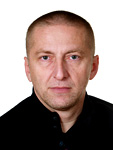 was born in Zagreb, Croatia. In 1997/98 he earned a Master's degree in Technical Science (scientific field of maritime transport technology). In 2002. he earned an academic degree of doctor for technical sciences (scientific field of maritime transport technology). Sailing experience he acquired in hydrographic survey since 1993. He is fluent in English. He was a member of the Telecommunications Council in Zagreb (2001. - 2004.), and member of the National Council for Higher Education (2005. – 2009.).
was born in Zagreb, Croatia. In 1997/98 he earned a Master's degree in Technical Science (scientific field of maritime transport technology). In 2002. he earned an academic degree of doctor for technical sciences (scientific field of maritime transport technology). Sailing experience he acquired in hydrographic survey since 1993. He is fluent in English. He was a member of the Telecommunications Council in Zagreb (2001. - 2004.), and member of the National Council for Higher Education (2005. – 2009.).
Faculty Council of Maritime faculty at University of Split, chose him for academic title of full university professor at 2010. He was a head of University Department for Forensic Science at University of Split. He is also a member of the Royal Institute of Navigation, London, UK, a certified engineer, a court expert at the County Court in Split, associate member of the Croatian Academy of Engineering, a full member of the Scientific Council for Traffic of the Croatian Academy of Arts and Sciences. He is associate member of American Academy of Forensic Science - AAFS.
Dr Vira Ratsiborynska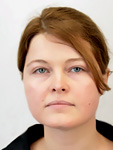 is a Research Analyst/ Visiting Scholar at the NATO Defense College.
Her areas of research interests include the relations between the EU-NATO and the Eastern partners, Russia and Central Asia, e.g. in energy, trade, geopolitics, border security, conflict management and peacekeeping.
She holds a Ph.D. from the University of Strasbourg, France, and wrote her dissertation on the European Neighbourhood Policy (with regard to the East) and publishes extensively in English and French on the topics of the European Union and the Eastern flank’s security, the relations with the Eastern Partnership countries, NATO and Russia. She obtained a Master’s degree in EU Studies from the College of Europe (Belgium/ Poland) and a Master in Political and Social Studies from Sciences Po (France).
Her professional experience includes working in the European institutions such as the European Parliament and the European Commission in Brussels. She also has corporate experience in an American public affairs consultancy in Brussels as well as experience in communication and diplomatic fields.
Dr. Ratsiborynska speaks English, French, Russian, Ukrainian, Polish and German.
is a Research Analyst/ Visiting Scholar at the NATO Defense College.
Her areas of research interests include the relations between the EU-NATO and the Eastern partners, Russia and Central Asia, e.g. in energy, trade, geopolitics, border security, conflict management and peacekeeping.
She holds a Ph.D. from the University of Strasbourg, France, and wrote her dissertation on the European Neighbourhood Policy (with regard to the East) and publishes extensively in English and French on the topics of the European Union and the Eastern flank’s security, the relations with the Eastern Partnership countries, NATO and Russia. She obtained a Master’s degree in EU Studies from the College of Europe (Belgium/ Poland) and a Master in Political and Social Studies from Sciences Po (France).
Her professional experience includes working in the European institutions such as the European Parliament and the European Commission in Brussels. She also has corporate experience in an American public affairs consultancy in Brussels as well as experience in communication and diplomatic fields.
Dr. Ratsiborynska speaks English, French, Russian, Ukrainian, Polish and German.
Sanda Svetoka is a Senior Expert at the NATO Strategic Communications Centre of Excellence (NATO StratCom COE) in Riga, Latvia. She is a project director and author of the COE studies – Social Media as a Tool of Hybrid Warfare; Internet Trolling: Latvian Case Study; New Trends in Social Media. Her current research project is focused on analysis of anti – NATO narratives in the Baltic and Balkan regions. Before joining the StratCom COE she has been working at the Latvian Ministry of Defence for the departments of defence policy, international cooperation and military public affairs. Ms Svetoka holds MA in Political Science from the University of Latvia.
is a Senior Expert at the NATO Strategic Communications Centre of Excellence (NATO StratCom COE) in Riga, Latvia. She is a project director and author of the COE studies – Social Media as a Tool of Hybrid Warfare; Internet Trolling: Latvian Case Study; New Trends in Social Media. Her current research project is focused on analysis of anti – NATO narratives in the Baltic and Balkan regions. Before joining the StratCom COE she has been working at the Latvian Ministry of Defence for the departments of defence policy, international cooperation and military public affairs. Ms Svetoka holds MA in Political Science from the University of Latvia.
Eyal Pinko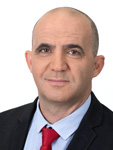 (Navy Commander, retired) served in the Israeli navy for 23 years. In those years he served 4 years in operational duties, 12 years as a project manager for several development programs, and for more than 6 years, as the head of operational and research branch at the Israeli naval intelligence. He served for 5 more years as the head of division at the ministry of defense (Civilian rank equal to RADM).
Eyal holds the Israel's security award, prime minister's decoration of excellence, DDR&D decoration of excellence, and IDF commander in chief decoration of excellence.
Since August 2017, he is a senior consultant for cyber and maritime cyber, focusing in cyber strategy, risk assessment, threat analysis, risk management and awareness. He holds bachelor’s degree with honor in electronics engineering, and two master’s degrees with honor in political science and in organizational development. Since 2015, he has been a PhD candidate at the Bar-Ilan university and a Research Fellow at the Haifa Maritime Policy and Strategy Research Center. His research focuses on strategy, asymmetrical and hybrid warfare, cyber and weapon systems.
(Navy Commander, retired) served in the Israeli navy for 23 years. In those years he served 4 years in operational duties, 12 years as a project manager for several development programs, and for more than 6 years, as the head of operational and research branch at the Israeli naval intelligence. He served for 5 more years as the head of division at the ministry of defense (Civilian rank equal to RADM).
Eyal holds the Israel's security award, prime minister's decoration of excellence, DDR&D decoration of excellence, and IDF commander in chief decoration of excellence.
Since August 2017, he is a senior consultant for cyber and maritime cyber, focusing in cyber strategy, risk assessment, threat analysis, risk management and awareness. He holds bachelor’s degree with honor in electronics engineering, and two master’s degrees with honor in political science and in organizational development. Since 2015, he has been a PhD candidate at the Bar-Ilan university and a Research Fellow at the Haifa Maritime Policy and Strategy Research Center. His research focuses on strategy, asymmetrical and hybrid warfare, cyber and weapon systems.
Suzanne Oyen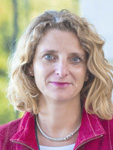 (Ma.Crim), security professional with two decades of accomplishments in security management from a strategy, policies, procedures, implementation and training perspective. Experience gathering threat intelligence from government, private and public sources.
(Ma.Crim), security professional with two decades of accomplishments in security management from a strategy, policies, procedures, implementation and training perspective. Experience gathering threat intelligence from government, private and public sources.
Now at Euroclear, Suzanne Oyen also managed a first-class team at Global Corporate Security; involved in recruiting, coaching and training to align performance with corporate’s objectives. Accountable for budget preparation and management related to physical security (CAPEX, Opex and travel budget). Responsible for Corporate Security for the worldwide SWIFT staff, infrastructure and premises. Security Advisor at Group 4 Securitas and Group 4 Courier, formulating security procedures and executing security audits and pre-employment screening. Acted as the liaison officer with government agencies in case of hold-ups, fraud and theft; conducted investigations. Audited compliance with existing processes. Led the initial setup and management of the Unit in charge of implementing the law of June 11, 2002 on Harassment, Violence and Improper Sexual Behaviour in the workplace for Belgacom Group, the main Belgian telecom operator (now Proximus Group).